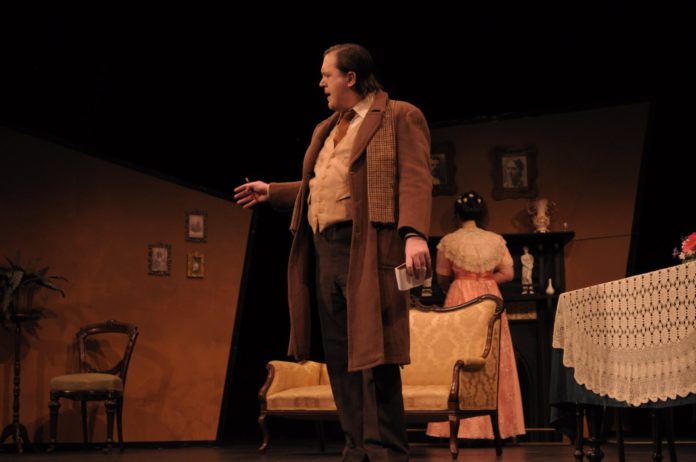In 1912 British social and economic structures stood like a colossus. In the previous year the “Titanic”, ultimate symbol of industry, power and wealth had been launched. The ship, like society itself was touted as unsinkable, indestructible.
So too stands the Birling family, successful and nouveau riche and with s for even greater social status.
In “An Inspector Calls” director Angela Short and designer Don Oswald have collaborated to produce a simple yet stunning Edwardian dining room. But cracks are beginning to appear. Literally. And the edges around the bay window are beginning to fray.
This benign setting is suddenly interrupted by the arrival of Inspector Goole. Who is he? What is he? Order is rapidly overtaken by disorder.
Patrick Clements and Rebecca Kemp as Mr. and Mrs. Birling play the patriarch and matriarch with convincing ease. They both possess the look of the era and carry themselves in a manner suited to their perceived position in society. His hopes for a knighthood and her “good works” being well defined.
The enigmatic Inspector, Mark Drury, is in complete control from the moment he enters, targeting each family member in turn. This is a commanding and well tempered performance.
The younger trio, those most likely to accept real responsibility and face real changes are similarly well drawn. Gerald Croft the upper class suitor is delightfully handled by Matthew Chapman. He has just the right balance of adoration and emotional complexity.
Lani Gerbi similarly produces a complementary emotional range as his fiancée Sheila Birling. I thought that she along with Dylan O’Connell, who played her ne’er do well brother Eric, were marginal standouts in a strong and even cast.
Eric’s obvious liking for the bottle and his inebriation throughout the play was subtly and expertly portrayed, as were his complex emotional changes.
This was a notable and seamless staging of Priestley’s play, pregnant with his social messaging and redolent of an era just before the fabric of British life would be rent asunder. A moment in time on the very cusp of unspeakable conflict and suffering yet a time of social upheaval that would ultimately see all those “below stairs” gaining a right to lead better lives.
Therry has presented an interesting and entertaining night at the theatre and the audience reflected that in their reaction and appreciation.



